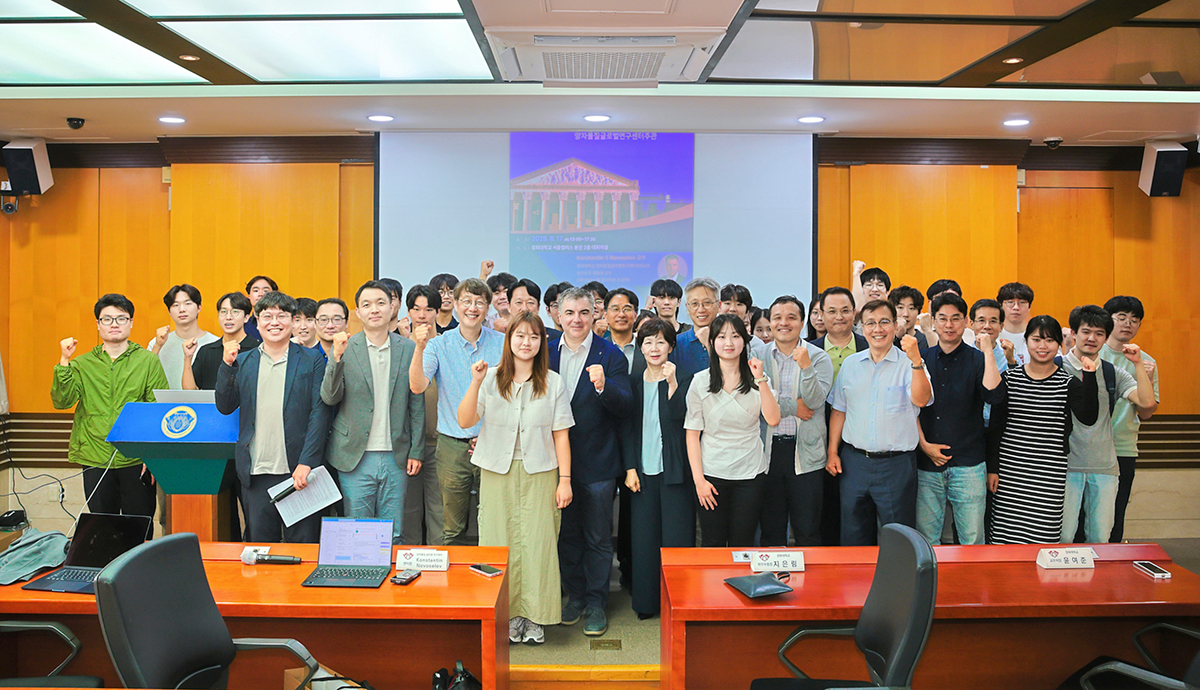header
News
Global Experts Gather to Advance Quantum Research at Kyung Hee Symposium
- WRITER 학무부총장실
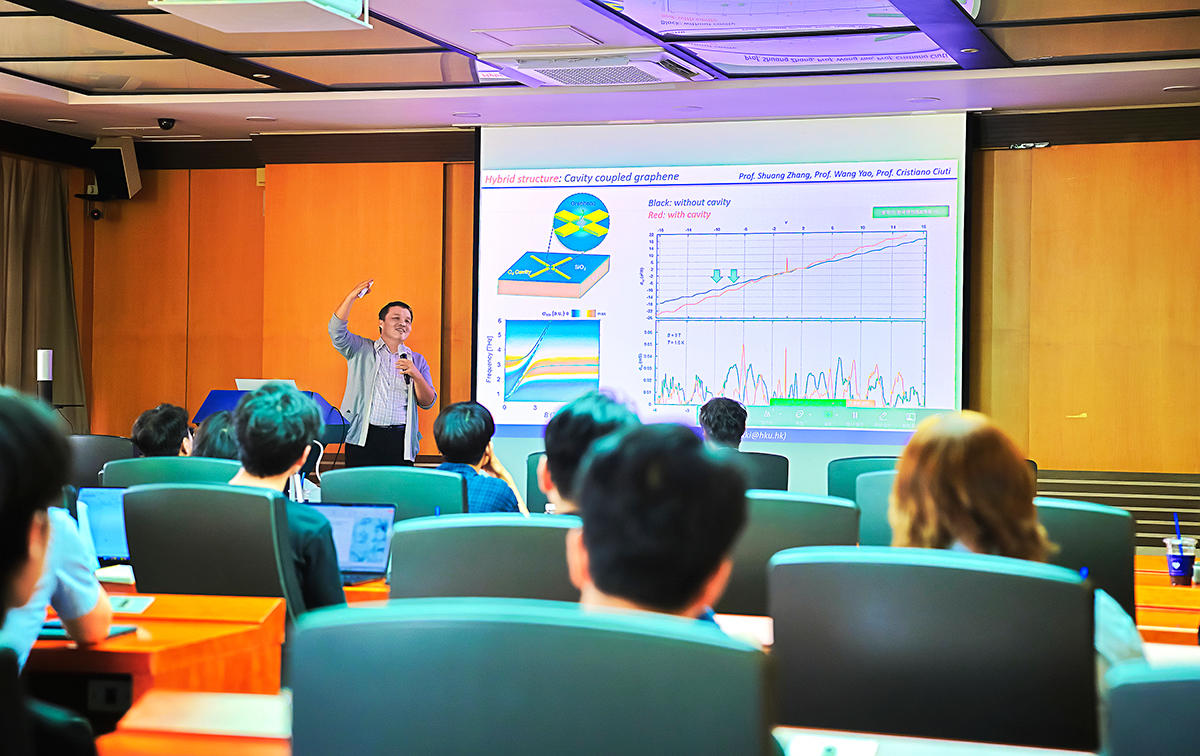
The Kyung Hee International Center for Quantum Matter (ICQM), led by Eminent Scholar Konstantin Novoselov (Director), hosted the 2025 Academic Symposium in mid-June in the Grand Conference Hall, located on the second floor of the Main Building on the Seoul Campus.
The event marked a significant milestone since the Center’s inauguration in November 2024, where it announced its ambitious commitment to advancing the field of quantum science. Renowned researchers from Korea and abroad gathered to share the latest developments in next-generation quantum materials and quantum information science, and to explore future directions for collaborative research. The symposium was organized by ICQM, in collaboration with the Education and Research Group for Innovation in Quantum Digital Technology under Brain Korea 21 Phase Four and the Quantum Information Society of Korea.
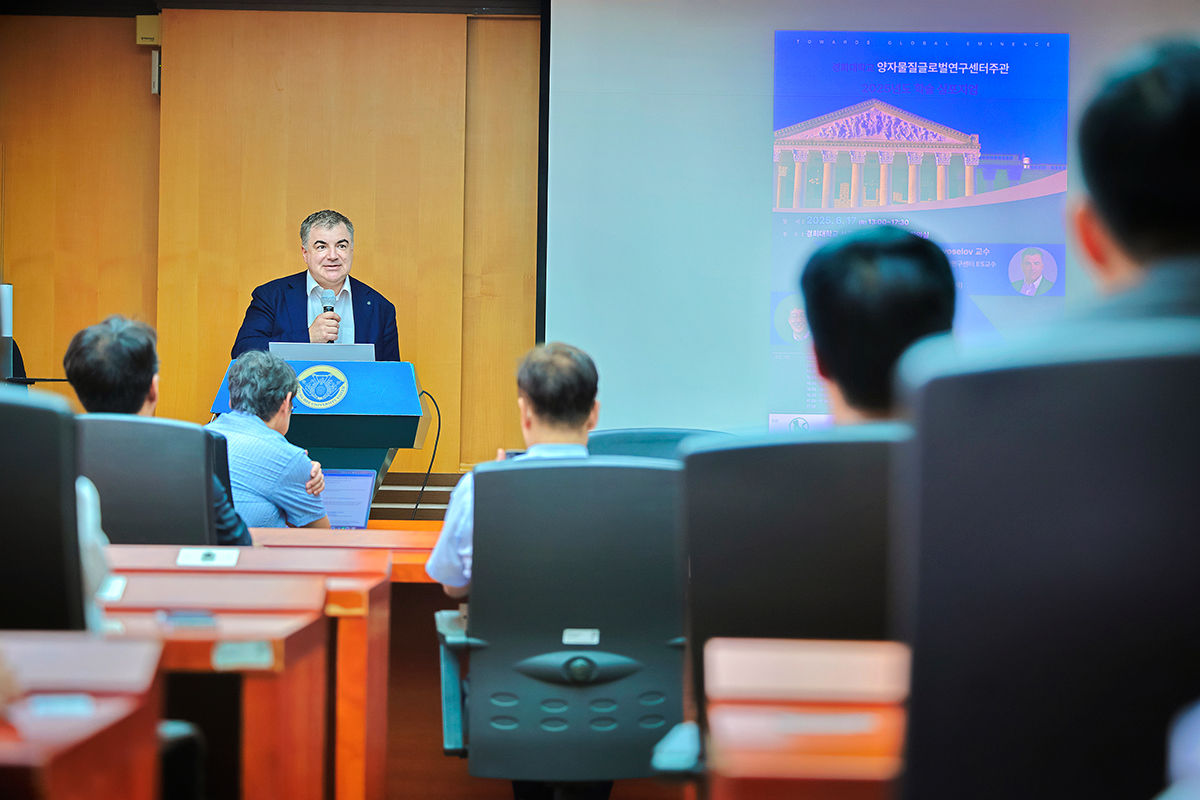
Symposium explores opportunities for global collaboration in quantum science
Since its inception, ICQM has aspired to become a global hub for quantum research. This symposium marked the Center’s first full-scale academic initiative. Eunlim Chi, Provost of the Seoul Campus, and Yoon Yeo Jun, Director of the Office of Academic Affairs, attended the event to show their support for ICQM. Eminent Scholars Novoselov (Director, ICQM; National University of Singapore) and Philip Kim (Senior Advisor, ICQM; Harvard University) welcomed participants onsite. The symposium was moderated by Professor Seok-Kyun Son (Deputy Director, ICQM) of the Department of Physics.
Prior to the official opening of the symposium, a pre-event session was held. Director Novoselov opened with a welcome message, stating: “I’ve been closely following the active progress of the International Center for Quantum Matter and have been impressed by the ongoing research and initiatives. There is growing global interest in quantum materials and quantum technologies, and it’s exciting to be part of that movement. Given the Center’s broad scope—from quantum technologies and two-dimensional(2D) materials to artificial intelligence and next-generation semiconductors—it’s no surprise that interest in our work continues to expand. I’ve had many discussions with researchers on these interdisciplinary projects, and I intend to keep fostering an open and collaborative atmosphere. I’m excited to learn from others and to see where our discussions today might lead in terms of future collaborations.”
Professor Philip Kim, Senior Advisor to the ICQM, remarked, “It is a great pleasure to be here and hear firsthand about the latest advances in our field. Events like this symposium are invaluable, as they bring together researchers who share common scientific interests to exchange ideas, stay updated on recent developments, and explore opportunities for collaboration.” He continued, “I look forward to engaging with the exciting work being done and to appreciating it together as a scholarly community. I also hope this symposium plays a key role in further establishing the ICQM as a leading hub for quantum materials research.”
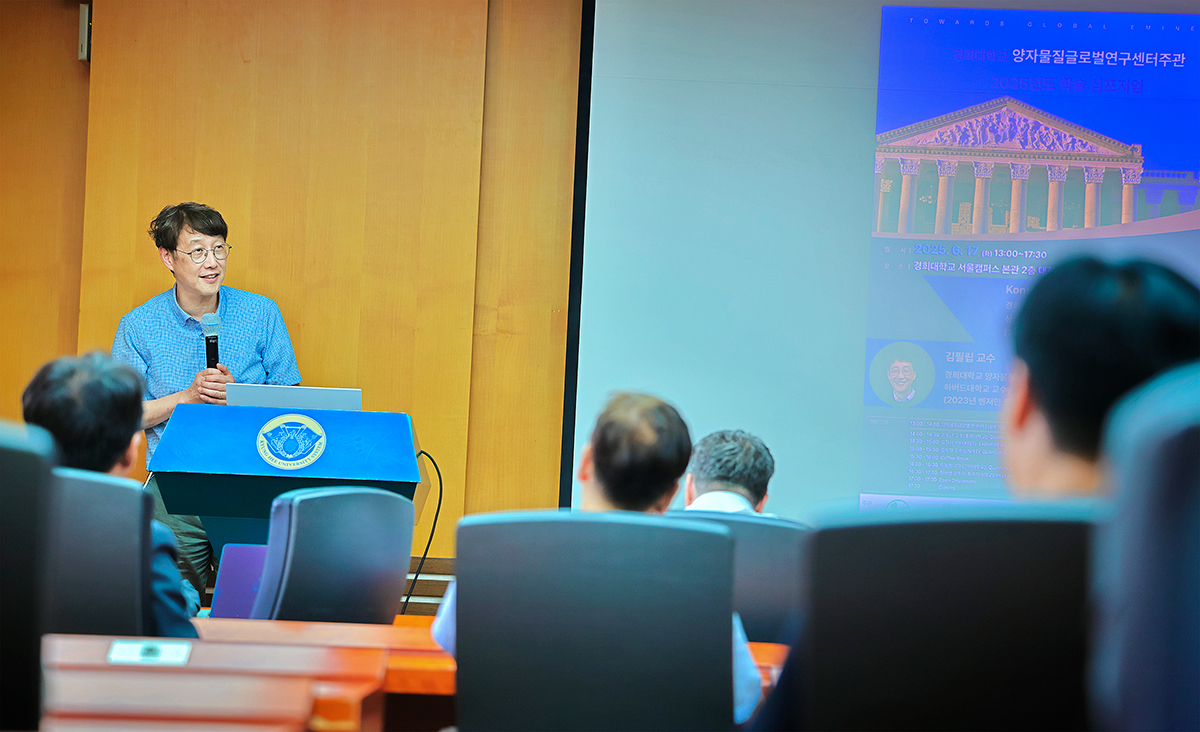
ICQM Presents “Future Science Talent Award” to Emerging Researchers in Quantum Science
Provost Eunlim Chi of the Seoul Campus delivered congratulatory remarks, expressing her strong support for the continued growth of the Center. “There are high expectations for the ICQM. With internationally renowned scholars such as Director Konstantin Novoselov and Senior Advisor Philip Kim, and with the dedication and expertise of Kyung Hee’s faculty, I am confident that the Center will continue to produce outstanding results,” she said. “I hope today’s symposium serves as a true celebration of academic excellence.”
The symposium also featured the presentation of the “Novoselov Future Science Talent Award.” First introduced during the Center’s inauguration in November of last year, the award was previously granted to 17 students across various Kyung Hee institutions—from Kyunghee Elementary, Middle, Girls’ Middle, and High Schools to the University’s undergraduate and graduate programs. This year, in alignment with the symposium’s academic focus, the award was presented to four emerging researchers actively engaged in scientific inquiry: Students Hye-Ryeong Choi and Ye-Rim Choi (Physics), and Students Gyu-Seock Ko and Youngjun Lee (Graduate School).
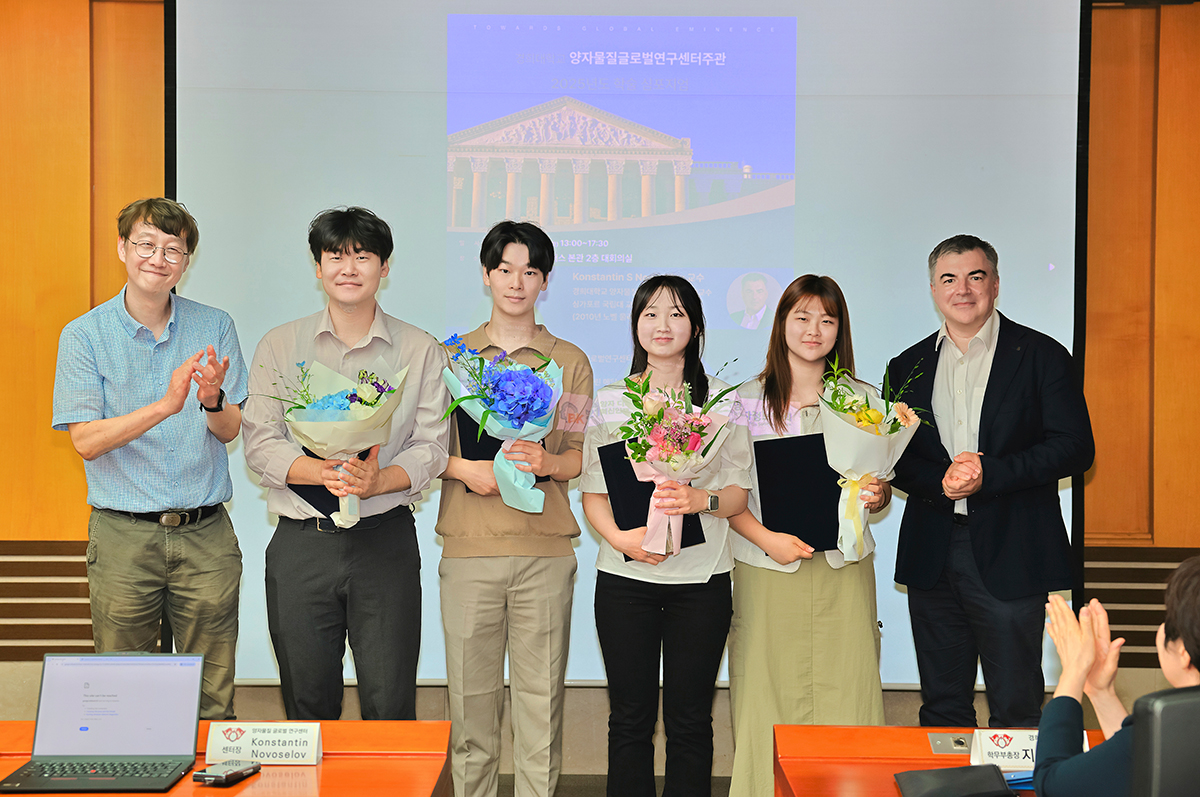
Latest advances in quantum science presented by leading researchers from Korea and abroad
The symposium featured five presentations by renowned experts in the field:
-Quantum Transport in Coupled 2D Materials by Professor Dong-Keun Ki of The University of Hong Kong
-Exploring Electron Transport in 2D Systems Through Quantum Sensing by Dr. Chulki Kim of the Korea Institute of Science and Technology (KIST)
-Quantum Playground with Solid-state Quantum Emitters by Professor Jehyung Kim of Ulsan National Institute of Science and Technology (UNIST)
-Quantum Sensing and Imaging: Emerging Tools for Probing Quantum Materials by Professor Donghun Lee of Korea University
-High-Fidelity Entanglement in Trapped-Ion Based Quantum Computing Processor by Professor Taeyoung Choi of Ewha Womans University
Professor Dong-Keun Ki of the University of Hong Kong delivered a presentation on quantum transport in 2D materials—crystalline layers just a few atoms thick. He explained that these materials are highly sensitive to their surrounding environment, including temperature and atmospheric conditions. When they are stacked or strongly coupled with one another, or combined with other materials in carefully engineered heterostructures, their electronic properties can be drastically modified. Professor Ki highlighted that such tunability enables the design of novel electronic components with enhanced or entirely new functionalities.
Dr. Chulki Kim of KIST introduced a research project focused on developing quantum sensing techniques using nitrogen-vacancy (NV) centers in diamond. NV centers—atomic-scale defects in the diamond lattice—are known for their exceptional sensitivity to magnetic and electric fields. Dr. Kim aims to harness these properties to probe electron dynamics in atomically thin materials. His research envisions a quantum “microscope” capable of visualizing electron transport phenomena with nanoscale precision, opening new pathways for studying low-dimensional quantum systems.
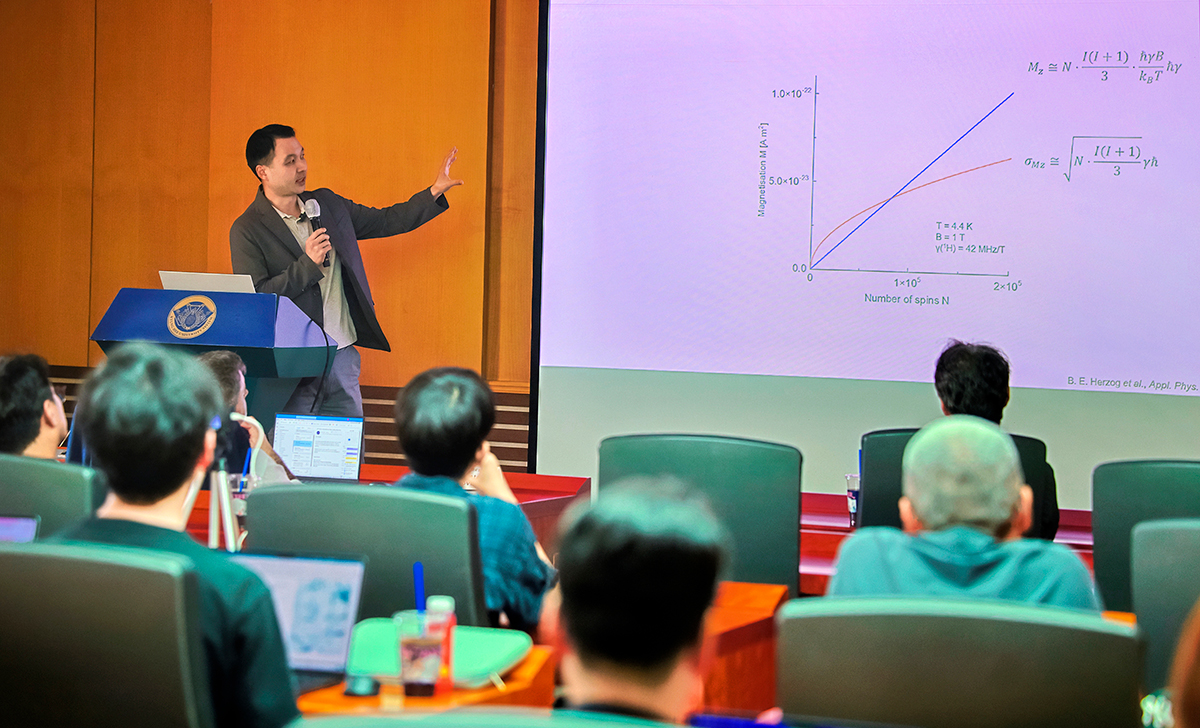
Engaging discussions sparked by the latest quantum research
Professor Jehyung Kim of UNIST presented his research on quantum light sources and their role in next-generation quantum information technologies. His talk focused on solid-state quantum emitters—particularly quantum dots embedded in semiconductors—that can generate single photons on demand. These photons can carry quantum information and enable applications in quantum communication and computing. Professor Kim also highlighted how the quantum spin states of these emitters allow precise control over photon emission, paving the way for scalable quantum networks and photonic quantum processors.
Professor Donghun Lee of Korea University also presented his research on quantum sensing using diamond NV centers. This technique enables the detailed observation of changes in the properties of 2D materials. By measuring the flow of electric current at the nanoscale, the method functions like a high-resolution microscope for the quantum world. It allows researchers to explore phenomena invisible to the naked eye, making it a promising tool for advancing the study of quantum materials.
Professor Taeyoung Choi of Ewha Womans University introduced the principles and recent advances of trapped-ion quantum computing. In this approach, electrically charged atoms (ions) are suspended in space using electromagnetic fields and individually manipulated with laser light to perform quantum operations. Because each ion can be controlled independently, this method enables precise, scalable quantum computations. Professor Choi discussed his ongoing experiments on manipulating entangled states of ions, highlighting the potential of trapped-ion systems to deliver highly reliable quantum logic operations—key components for realizing universal quantum computers.
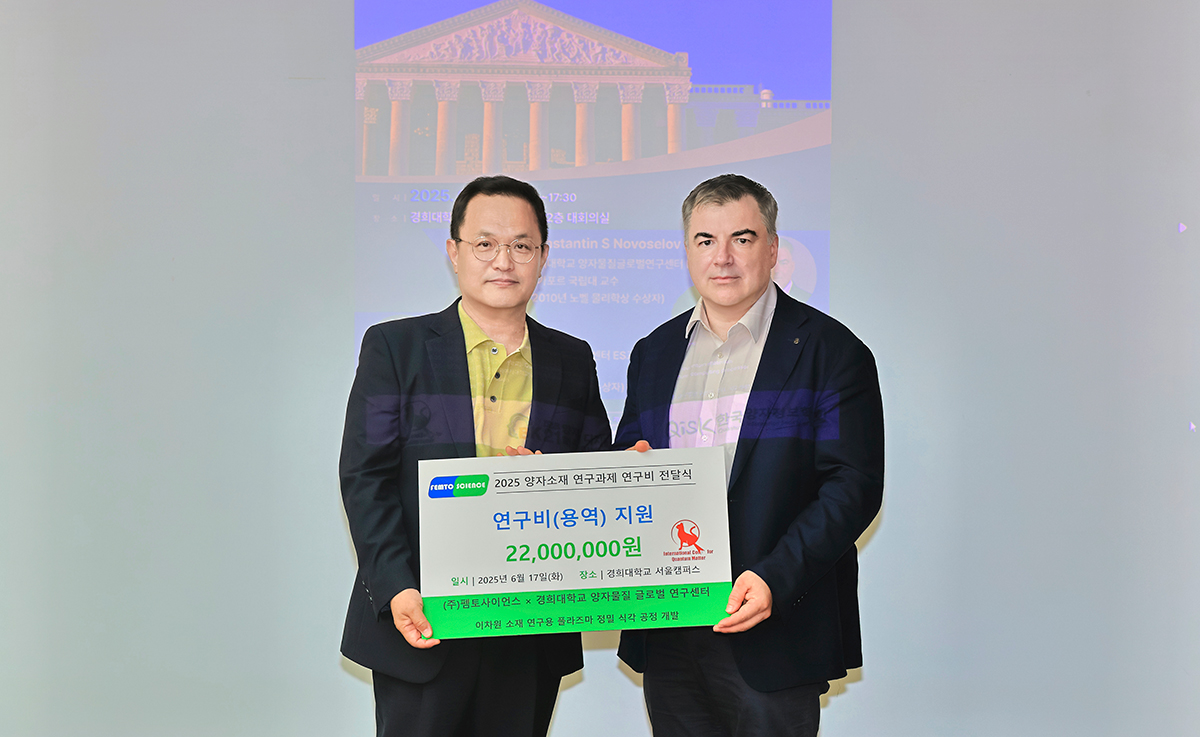
ICQM and Femto Science hold research grant ceremony for quantum materials project
At the symposium venue, a research funding ceremony was held to mark the collaboration between the Center and Femto Science Inc. The two parties are jointly pursuing a project aimed at developing plasma-based precision etching processes for fabricating quantum materials using 2D substrates. As part of this initiative, Femto Science is providing ICQM with a research grant of 22 million KRW. Muhwan Kim (CEO, Femto Science) remarked, “We look forward to continued collaboration with ICQM, especially in the areas of materials, parts, and equipment. By combining on-site industry insights with the high-quality research led by Kyung Hee faculty members, we hope to generate meaningful opportunities for innovation.”
Professor Seok-Kyun Son (Deputy Director, ICQM) concluded the symposium by emphasizing its broader significance: “Our mission at the International Center for Quantum Matter is to create transformative innovation at the forefront of quantum materials research. Guided by this vision, we are focused on building world-class research infrastructure, advancing global scientific collaboration, and nurturing future leaders in quantum science. This symposium served as a meaningful platform to explore cutting-edge research by distinguished scholars, to celebrate the achievements of emerging researchers, and to share the tangible outcomes of our industry-academia partnerships.”
